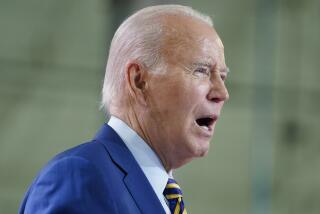Clinton to Seek Cut in Medicare Outpatient Costs
- Share via
WASHINGTON — The cost to Medicare beneficiaries of surgeries and tests performed while they are hospital outpatients would fall sharply--in some instances by more than half--under a provision in the budget that President Clinton will submit to Congress on Thursday.
A hernia repair, for which beneficiaries now typically pay $519, would cost only $212, according to the National Committee to Preserve Social Security and Medicare. A diagnostic colon test, which costs the average beneficiary $164, would carry a price tag of $79.
Altogether, a Clinton administration official estimated Monday, the change could save the nation’s 38 million Medicare beneficiaries $13.4 billion over six years.
But it would cost the government nothing. The entire burden would be borne by the hospitals.
The proposal would fix what many in Washington see as an unintended inequity that forced Medicare recipients to pay more for outpatient care, in which a person undergoes surgery or diagnostic procedures without checking into the hospital, than they do for inpatient treatment.
“We view this as an important reform to protect beneficiaries from paying out-of-pocket costs not intended by the Medicare program,” the administration official said. “This was a glitch that developed over several years.”
Congress had asked for the correction several years ago and is expected to look favorably on the plan.
Reducing out-of-pocket expenses for seniors is especially important now because the administration has called for Medicare beneficiaries to pay higher monthly premiums as part of a plan to balance the budget in six years. Under that plan, beneficiaries would pay $61.90 a month in 2002, up from $51.50 in current law.
*
The discrepancy between inpatient and outpatient costs was not seen as a serious problem until in recent years, when hospitals began shifting many procedures to an outpatient basis. Today, broad categories of surgery, radiology and diagnostics are considered outpatient procedures. They include knee surgery, cataract surgery, hernia repairs, mammograms, CT scans, MRI scans and a variety of other diagnostic tests.
Under existing law, Medicare has a fee schedule that limits what hospitals may charge for inpatient services: Medicare picks up 80% of the tab and the beneficiaries pay the other 20%.
But hospitals may set outpatient fees at any level. While Medicare still pays 80% of its fee schedule for those patients, the share the Medicare beneficiaries pay is not restricted by the schedule. They must pay 20% of a hospital’s going rate.
The administration wants the patients’ 20% share also brought under the Medicare fee schedule.
For example, Medicare might set a $1,000 fee for a particular test that is listed at $2,000 on the hospital’s fee schedule. An inpatient would pay $200 (20% of the Medicare-approved $1,000 fee), and the government would pay the other $800. For an outpatient, the government would still pay only $800. But the patient would pay $400 (20% of the $2,000 hospital fee).
Although the proposal was welcomed warmly by senior lobbying organizations, hospitals are not happy with the change--even though they regard it as relatively minor compared with the larger hits they will be asked to take under the administration’s proposed budget. That fiscal plan wants doctors, hospitals and health maintenance organizations to bear the brunt of $138 billion in savings from the growth of Medicare spending over six years.
Patricia Smith, federal health lobbyist for the largest senior organization, the 32-million-member American Assn. of Retired Persons, said: “We are very pleased to see the administration proposal. This is a really important step for beneficiaries.”
In the budget document to be submitted Thursday, the administration will ask Congress to change the law to limit co-payments by the beneficiary for outpatient tests and procedures. The co-payments will be reduced gradually over the next 10 years to an amount equal to 20% of Medicare’s approved charges.
The White House proposed the change in the outpatient payment system last year, but there was no Medicare legislation as Congress and the president argued over the best way to assure the system’s solvency.
*
“We are really pushing it this time,” said the administration official, noting that chances seem better for an agreement on Medicare.
The administration’s $138-billion Medicare savings goal is higher than the White House budget figure of $124 billion last year, and it is closer to the total of $158 billion suggested last year by congressional Republicans.
Medicare, for people 65 and over and the disabled of all ages, is now the fourth-largest spending activity of the federal government, ranking behind Social Security, Defense and interest payments on the national debt.
More to Read
Get the L.A. Times Politics newsletter
Deeply reported insights into legislation, politics and policy from Sacramento, Washington and beyond. In your inbox twice per week.
You may occasionally receive promotional content from the Los Angeles Times.










